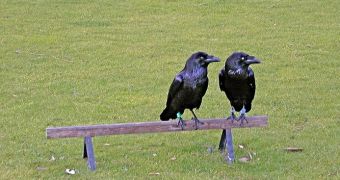New Caledonian crows are apparently able to use tools in their natural ecosystems, researchers report. The finding is very important because it represents the first time that this type of behavior has been observed outside the highly controlled settings of scientific laboratories. The new investigation was conducted using motion-sensitive video cameras, which analyzed the birds in their natural homes for more than 1,800 hours. The science team, made up of researchers from the Oxford University and the University of Birmingham, both in the UK, published its results in the latest issue of the respected scientific journal Proceedings of the Royal Society B, ScienceDaily reports.
What the new study suggests beyond the shadow of a doubt is the fact that New Caledonian crows actually use artificial tools more than they use their beaks. One of their favorite meals is the larva form of the large beetle. This food is generally concealed inside holes in dead wood, and is therefore fairly difficult to get to. The new investigation proves that not only are crows able to use sticks to extract the larvae from the safety of their holes, but also that the birds that tend to do so use sticks more often than they use their beaks. The crows essentially utilize the tools for “fishing purposes,” the team has determined.
Another amazing discovery is the fact that older crows appear to be a lot more apt to remove larvae from dead wood than younger ones. According to the science team, this suggests that progressive learning, possibly from highly experienced “fishers,” may be the key to getting a grip on this difficult hunting process. Another conclusion to be drawn from this could be that the birds learn to copy each others' behavior since infancy. This, in turn, allows them to catch more larvae, boosting the group's ability to survive. It is, in other words, another classic tale of how animals got to support cooperation over competition in their daily lives.
The British team has also been surprised to learn that the New Caledonian crows appear to be apt to match the right tool to the right hole in the wood. That is to say, certain holes were naturally deeper than others. The tools that the researchers collected from the study area were found to be of different lengths, depending entirely on which hole they were used on. This implies that the crows know that shorter sticks cannot be used on larger holes, which is a sign of higher mental abilities. The new work has been conducted under a grant from the UK Biotechnology and Biological Sciences Research Council (BBSRC).

 14 DAY TRIAL //
14 DAY TRIAL //